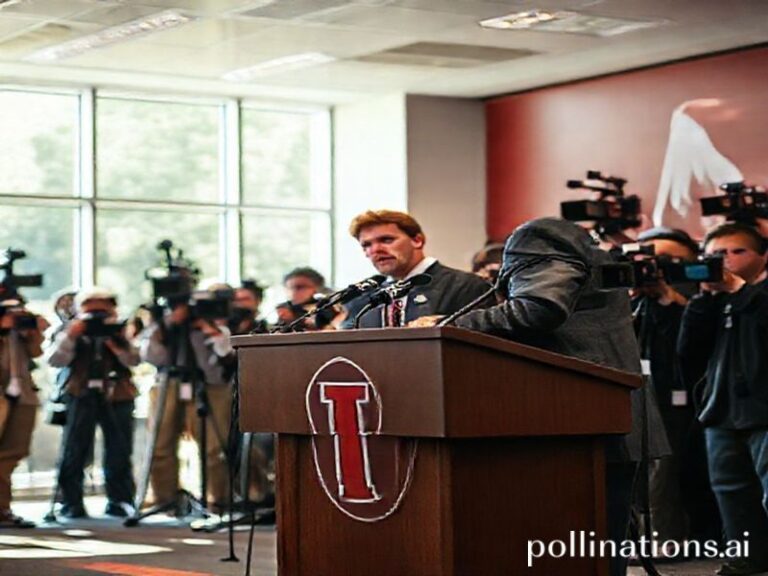AJ Brown: The Global Export America Didn’t Sanction (Yet)
AJ Brown, the Philadelphia Eagles’ human highlight reel, is currently doing to NFL secondaries what global supply chains did to common sense during the pandemic—namely, shredding them into small, expensive pieces and shipping them overnight to stunned recipients. While Americans debate whether he’s the second coming of Terrell Owens with better manners or simply a very fast accountant who moonlights as a gladiator, the rest of the planet watches with the detached amusement of people who already treat American football the way Americans treat cricket: vaguely aware it exists, mildly curious why everyone keeps crashing into each other, and absolutely certain the commercials last longer than the war in Afghanistan.
From Lagos to Lisbon, sports-bar televisions flicker with Brown’s latest 40-yard stutter-and-go, a route so sharp it could slice the eurozone’s budget deficit in half. European viewers—still nursing psychic wounds from the World Cup—console themselves that at least Brown’s touchdowns don’t require a VAR review that lasts long enough to brew an espresso, drink it, and file for unemployment. Meanwhile in Seoul, K-League fans view the spectacle through the lens of K-pop choreography: every double-move is a dance break, every stiff-arm a gesture worthy of BTS. The South Korean sports pages, ever polite, describe him as “a respectful Calvin Johnson,” which is the closest Korean journalism gets to calling someone a polite wrecking ball.
In truth, Brown’s ascent carries the faint aroma of late-stage capitalism’s greatest hits: a kid from Starkville, Mississippi, becomes a millionaire because he can outrun despair, jump higher than systemic poverty, and stiff-arm the NCAA’s amateurism charade into oblivion. The global audience recognizes the archetype; it’s the same one that produces Premier League strikers from Brazilian favelas or Bundesliga midfielders culled from refugee camps. The only difference is padding and the occasional concussion protocol that resembles a Monty Python sketch performed by actual doctors.
Yet the worldwide implications of Brown’s brilliance aren’t merely athletic. They’re geopolitical in the same way that any spectacle is: a distraction engineered to keep the masses from asking why bread costs more than Bitcoin in Ankara. When Brown hauls in a contested catch while absorbing enough G-force to liquefy a lesser mortal’s spleen, the collective global intake of breath drowns out the quieter collapse of, say, Argentine pesos. Bread and circuses, meet avocado toast and red-zone targets.
International bookmakers—those charming offshore arithmeticians who could give a TED Talk on moral flexibility—now price Eagles playoff futures tighter than a Swiss bank vault. The implied probability of Philadelphia hoisting a Lombardi Trophy moves currency markets in Manila the same way Taylor Swift’s tour schedules nudge hotel stocks; we live in a world where a wide receiver’s hamstring tightness can shift macroeconomic sentiment. If that’s not late-capitalist poetry, I don’t know what is.
Back in the States, Brown’s social-media feed toggles between workout montages and cryptic philosophical musings that read like Marcus Aurelius ghostwriting for a Nike campaign. Abroad, those captions get translated into forty languages, each losing a little more nuance until “Trust the process” arrives in Finnish as “Reliable sausage procedure,” which honestly sounds like a better life philosophy anyway.
So what does AJ Brown mean to a planet simultaneously on fire and underwater? The same thing any transcendent athlete means: a reminder that humans can still do something perfectly, even if the surrounding civilization resembles a toddler’s attempt at Jenga. He is the rare export America can ship without requiring a congressional hearing—though give it time; someone in D.C. will propose tariffs on touchdowns any day now.
In the end, Brown runs routes the way diplomats wish they could run summits: precise, explosive, and mercifully free of press-pool spin. The world watches, half-impressed, half-envious, fully aware that when the lights dim, we’ll still need to deal with the bill for all this bread and circus. Until then, we lean back, order another round, and enjoy the spectacle—because if we’re all going to hell anyway, we might as well watch someone sprint there in 4.4 seconds flat.







